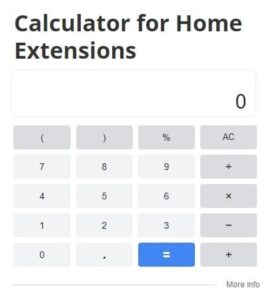
At Home Owners Association, we often receive questions about tax deductions for home improvements. Many homeowners wonder, “Can I write off home improvement costs?”
The answer isn’t always straightforward, but understanding the potential tax benefits of your renovations can lead to significant savings.
This guide will explore the types of home improvements that may qualify for tax deductions and provide insights on how to document your expenses properly.
What Qualifies for Home Improvement Tax Deductions?
Repairs vs. Improvements: A Crucial Distinction
The IRS differentiates between repairs and improvements. Repairs maintain your home’s current condition and typically don’t qualify for tax deductions. Improvements, however, add value to your home or extend its life, potentially qualifying for tax benefits.

For instance, fixing a leaky pipe is a repair. Installing a new, more efficient plumbing system is an improvement. The latter could potentially qualify for a tax deduction.
General Rules for Home Improvement Tax Deductions
Most home improvements don’t offer immediate tax deductions. However, they can reduce your tax bill when you sell your home by increasing your home’s cost basis, which lowers your capital gains.
Consider this example: If you bought your Melbourne home for $500,000 and spent $50,000 on qualifying improvements, your new cost basis would be $550,000. The CGT is calculated based on the difference between the purchase cost and the sale price and is generally payable by the person who disposed of the asset.
Types of Improvements That May Qualify
Energy-Efficient Upgrades
Energy-efficient upgrades often qualify for tax credits. The Community Clubs Program provides rebates of up to $100,000 per club to upgrade to more energy efficient appliances and energy systems.
Accessibility Modifications
Accessibility modifications for medical reasons may also qualify. If you need to install a wheelchair ramp or widen doorways due to a medical condition, these costs could be deductible as medical expenses.
Home Office Renovations
Home office renovations can be partially deductible if you’re self-employed and use the space exclusively for work. However, remote employees can’t claim this deduction under current tax laws.
Rental Property Improvements
If you’re renting out part of your Melbourne property, improvements to the rental portion may be tax-deductible.
Tax laws change frequently. While we strive to provide accurate information, always consult with a tax professional for the most up-to-date advice tailored to your situation. They can help you navigate the complexities of Australian tax law and maximize your potential deductions.
Now that we’ve covered what qualifies for tax deductions, let’s explore how to properly document your home improvement expenses to ensure you can claim these deductions when the time comes.
Tax-Deductible Home Improvements in Melbourne
Energy-Efficient Upgrades
Melbourne homeowners can benefit from energy-efficient upgrades that reduce their carbon footprint and offer tax advantages. The Australian Government’s Small-scale Renewable Energy Scheme (SRES) provides financial incentives for eligible systems such as solar panels, solar water heaters, and heat pumps.

From 1 July 2024, all Australian households and eligible small businesses will receive a rebate on their electricity bills through the SRES program.
The Victorian Government’s Solar Homes Program offers additional rebates of up to $1,000 for eligible heat pump and solar hot water systems.
Home Office Renovations
The rise of remote work has increased the popularity of home office renovations in Melbourne. Self-employed individuals or those who run businesses from home may qualify for deductions on home office expenses, including renovations.
The Australian Taxation Office (ATO) allows claims for a portion of home running costs if a dedicated work area exists. This can include depreciation on office furniture and equipment, as well as a percentage of electricity and internet costs (based on the floor area of the home office).
Medical Necessity Modifications
Melbourne homeowners who need to modify their homes due to medical conditions or disabilities may find these improvements tax-deductible. The ATO considers these as medical expenses, which can be claimed if they exceed the threshold of 10% of adjusted taxable income.
Tax-deductible modifications often include:
-
Installing ramps
-
Widening doorways for wheelchair access
-
Adding handrails in bathrooms
To support your claim, maintain detailed records and obtain a doctor’s recommendation.
Rental Property Improvements
Melbourne property owners who rent out part or all of their property can enjoy significant tax benefits from improvements. The ATO allows immediate deductions for repairs and maintenance, while capital improvements can be claimed as depreciation over several years.
Consider these examples:
-
Replacing carpet in a rental property: Claim the full cost as an immediate deduction
-
Installing new kitchen cabinets: Depreciate this capital improvement over time
Tax laws can change and often present complexities. Consultation with a qualified tax professional ensures you maximize your deductions while complying with current regulations. Home Owners Association can connect you with trusted experts in Melbourne who understand the nuances of property-related tax deductions.
As we move forward, it’s important to understand how to properly document these home improvement expenses to ensure you can claim these deductions when the time comes.
How to Document Home Improvement Expenses
Keep Detailed Records
Melbourne homeowners must maintain comprehensive files for each home improvement project. Include all invoices, receipts, and bank statements related to the work. The Australian Taxation Office (ATO) recommends preserving these records for at least 5 years after you dispose of the property.

For larger projects, create a spreadsheet to track expenses. List the date of purchase, item description, cost, and purpose of each expense. This level of detail will prove invaluable if you face an audit.
Obtain Necessary Permits and Certifications
Many home improvements in Melbourne require council permits. These documents ensure your project meets local building codes and serve as official proof of the completed work. Keep copies of all permits, along with any certificates of occupancy or completion issued by the council.
For energy-efficient upgrades, obtain certificates from the Clean Energy Regulator. These are essential for claiming benefits under the Small-scale Renewable Energy Scheme (SRES).
Work with Professionals
Engage qualified professionals to streamline the documentation process. A licensed builder or contractor in Melbourne should provide detailed quotes and invoices, breaking down labor and material costs. This itemization is important for distinguishing between deductible improvements and non-deductible repairs.
For complex renovations or significant home office upgrades, work with a quantity surveyor. They can provide a depreciation schedule, which you need for claiming capital works deductions over time.
Consult a Tax Expert
Seek advice from a tax professional who specializes in property-related deductions. They can guide you on which expenses are deductible and help you organize your documentation effectively. The Australian Taxation Office website offers a tool to find registered tax agents in Melbourne (ensuring you receive advice from a qualified professional).
Organize Digital Records
Try to create a digital backup of all your home improvement documentation. Scan receipts, permits, and other important papers. Store these files in a secure cloud service or on an external hard drive. This practice protects your records from physical damage and makes them easily accessible when needed.
Final Thoughts
Home improvements offer potential tax benefits for Melbourne homeowners, but tax law complexities require expert guidance. Many renovations don’t provide immediate tax deductions but can reduce capital gains tax when you sell your property. We at Home Owners Association recommend maintaining detailed records of all home improvement expenses, including receipts, invoices, and relevant permits.

Tax regulations change frequently, so consulting with a qualified tax professional will help you maximize available deductions while staying compliant. Strategic home improvements not only offer potential tax benefits but also enhance your property’s long-term value. You should focus on projects that improve your quality of life and add value to your home.
The Home Owners Association offers valuable resources and support for Melbourne homeowners seeking to make the most of their home improvement projects. With access to trade pricing, expert advice, and educational materials, members can confidently undertake home improvement projects while potentially reducing their costs. The question “Can I write off home improvement costs?” doesn’t always have a simple answer, but understanding the potential tax implications of your renovations can lead to significant savings.





